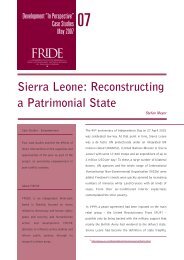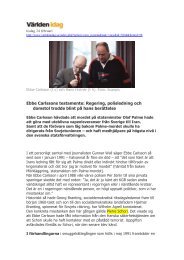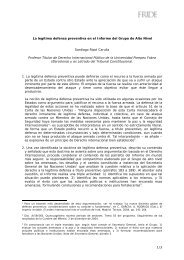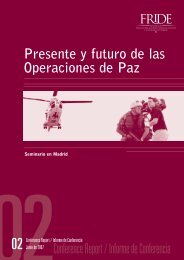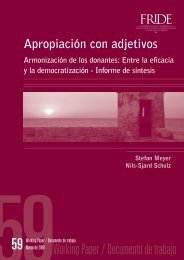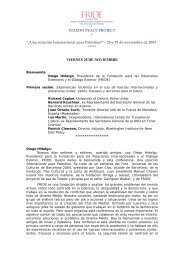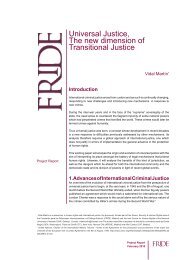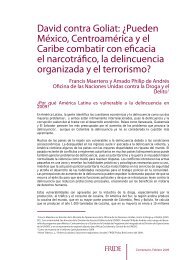Quick Fix or Quicksand? Implementing the EU Sahel Strategy - FRIDE
Quick Fix or Quicksand? Implementing the EU Sahel Strategy - FRIDE
Quick Fix or Quicksand? Implementing the EU Sahel Strategy - FRIDE
You also want an ePaper? Increase the reach of your titles
YUMPU automatically turns print PDFs into web optimized ePapers that Google loves.
12<br />
WORKING PAPER 114<br />
low-intensity instability. This was ostensibly to prevent <strong>the</strong> oil expl<strong>or</strong>ation that adequate<br />
security conditions would permit. Algiers w<strong>or</strong>ries that <strong>the</strong> discovery of oil in Malian wells<br />
could deplete oil reserves on its own sou<strong>the</strong>rn frontiers. 34<br />
European suspicions of Algeria have also grown given <strong>the</strong> country’s inconsistent policy<br />
towards <strong>the</strong> Islamist insurgents controlling n<strong>or</strong><strong>the</strong>rn Mali since early 2012. Iyad Ag Ghali,<br />
head of <strong>the</strong> Ansar Deen group affiliated to AQIM, is known to maintain communication<br />
lines with Algeria’s intelligence service. Algiers supp<strong>or</strong>ted only equivocally initial<br />
regional and international eff<strong>or</strong>ts to craft a regional military response towards rest<strong>or</strong>ing<br />
government control in Mali’s n<strong>or</strong>th. F<strong>or</strong> example, whilst Algeria officially depl<strong>or</strong>es<br />
Islamist control over Malian cities such as Gao, where seven Algerian diplomats were<br />
kidnapped in April, Algiers has maintained its vehement opposition to ECOWAS’s<br />
deployment of a stabilisation f<strong>or</strong>ce <strong>the</strong>re.<br />
The sources of Algerian non-cooperation with <strong>the</strong> <strong>EU</strong> are as deep-seated as <strong>the</strong>y are<br />
varied. In April 2010, Algeria established a Joint Military Command with Mali, Niger and<br />
Mauritania. This move, ostensibly to chart a common approach through <strong>the</strong> pooling of joint<br />
monit<strong>or</strong>ing f<strong>or</strong>ces totalling about 75,000, was part of Algiers’ attempt to curtail European<br />
security involvement. By <strong>the</strong> outbreak of <strong>the</strong> Malian crisis in 2012, participating states had<br />
yet to commit <strong>the</strong> needed troops. On 2 June 2011, Algeria led regional preparations f<strong>or</strong><br />
<strong>the</strong> fallout from <strong>the</strong> Libya conflict with a tri-b<strong>or</strong>der drill involving Mauritania and Mali,<br />
followed a week later by a joint Mauritanian-Malian attack against AQIM’s supply camp<br />
in a f<strong>or</strong>est near Segou, Mali.<br />
In December 2011, Algerian instruct<strong>or</strong>s were sent to n<strong>or</strong><strong>the</strong>rn Mali even though Algeria<br />
had repeatedly voiced strong opposition to Mali’s role in facilitating ransom payments to<br />
terr<strong>or</strong>ists. Meanwhile, Mali and o<strong>the</strong>r regional states point to certain controversial Algerian<br />
policies. First, it was <strong>the</strong> Algerian intelligence service that drove Algerian jihadists into<br />
Mali’s n<strong>or</strong>th. The same service has allegedly supp<strong>or</strong>ted various Tuareg rebellions to counter<br />
Muammar Gadaffi’s influence. In December 2010, Mali’s President Toure, fearing a coup,<br />
removed Malian officers who were regarded as close to Algeria’s intelligence service.<br />
As noted above, Algeria seems keen to maintain perceptions of an ongoing threat of<br />
terr<strong>or</strong>ism to fur<strong>the</strong>r its own self-interests. Algeria’s attitude towards AQIM units operating<br />
deep in <strong>the</strong> <strong>Sahel</strong> away from its capital could be seen as a midway strategy between Mali’s<br />
evasive tactic and Mauritania’s blunt confrontation. Even as <strong>the</strong> <strong>Sahel</strong> faces widening<br />
destabilisation, a meeting of <strong>the</strong> Arab Maghreb Union scheduled f<strong>or</strong> October 2012 in<br />
Tunisia was postponed. 35 Lingering differences between M<strong>or</strong>occo and Algeria have held up<br />
plans f<strong>or</strong> a Maghreb summit since leaders from across <strong>the</strong> region last met in 1994.<br />
Algerian suspicion of <strong>EU</strong> intentions is fur<strong>the</strong>r connected to hist<strong>or</strong>ical animosities with<br />
France as a leading European state. As one analyst observed: ‘Algeria boasts reserves<br />
estimated at $230 billion. If France wants to play a role in <strong>the</strong> Arab w<strong>or</strong>ld, it… knows full<br />
well that reconciliation with Algeria is an essential prerequisite. A m<strong>or</strong>e outward looking<br />
34. Annette Lohmann, ‘Who Owns <strong>the</strong> Sahara? Old Conflicts, New Menaces: Mali and <strong>the</strong> Central Sahara between <strong>the</strong> Tuareg, Al Qaida and <strong>or</strong>ganised<br />
crime’, Peace and Security Series 5, Friedrich Ebert Stiftung, 2011.<br />
35. ‘Maghreb summit risks ano<strong>the</strong>r delay’, Al Magharebia, 13 August 2012. Available at: http://www.magharebia.com/cocoon/awi/xhtml1/en_GB/<br />
features/awi/features/2012/08/13/feature-01



